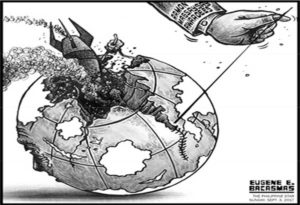The mosques of Marawi City
The armed conflict in Marawi City entered its 100th day last Wednesday, August 30, with the Maute rebels still in control of some areas in the city center.
In its report a few days earlier, the Armed Forces of the Philippines (AFP) said there were still 30 to 40 rebel holdouts hiding in the ruins of mosques and other buildings, and holding several hostages. The troopers were cleaning up the area street by street, building by building, shunning a massive attack so as to avoid causing too many casualties.
Last Wednesday President Duterte said he had held back the AFP from bombing the mosques in which the rebels had holed up, as it would create hostility and animosity among the Muslim residents of Marawi and other parts of Mindanao. But the war may have gone on too long, he said, so he was now leaving it to the AFP – its top officials and its ground commanders – to decide if they should now launch an all-out assault to end the war, including – if necessary – the bombing of all buildings, including mosques, now serving the rebels as defensive bulwarks against advancing government troops.
We can understand the impatience expressed by some quarters over the Maute rebels’ continuing ability to hold off government forces. But the fighting in Marawi City is not just a clash of arms. It is also a battle for the hearts and minds of the local people in this center of Muslim culture in Mindanao.
In those areas of Marawi which have been cleared of rebels, soldiers and policemen, armed with brooms and paintbrushes, have begun to clear the battered streets. Special units of Maranao policemen were assigned to clear the mosques to ensure that the job is done without violation of any religious beliefs and practices.
An all-women contingent of 102 army and police women has been formed for deployment in evacuation centers in Iligan City and other areas in Lanao del Sur to assist the families forced to leave their homes in Marawi City. The 102 are not all Muslims, but they all wear white hijabs, white scarves with which they cover their heads the way Muslim women do,.“It is one way of showing our respect for Muslim culture. It is an honor to wear it,” said one of their officers.
All these efforts will go to naught if we now set aside all concerns for the feelings and concerns of the people of Marawi. Their mosques are very important parts of their lives, just like the cathedrals and shrines of Christians. When they return to their homes from the evacuation centers, they will seek to pick up where they had left off. They will want to gather once again in their mosques.
President Duterte said the war in Marawi is taking too long and so he was now leaving up to the military. We are certain that the military leadership understands the concerns and the principles behind President’s policy of restraint all these months. They may have been given the option to undertake an all-out military operation to clear Marawi City of rebels, but they will, we hope, continue the fight with all due concern for what the people of Marawi, the victims of this war, hold dear, including their places of worship.













